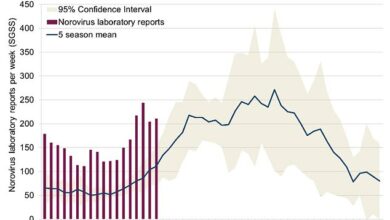Nine daily habits that will help you live longer: They’ve all been scientifically proven to extend life, our experts explain how much longer you could get











We know that ageing is inevitable – but let’s be honest, who wouldn’t want to slow down the process if they could – and now new research might just have brought that possibility a step closer.
Last week, a team of scientists reported they’d found that a new drug can extend the lifespan of mice by up to 25 per cent.
It works by blocking the action of a molecule called interleukin-11 (IL-11) which has been linked to inflammation, muscle wasting and many other signs of ageing.
Videos released showed untreated mice with greying patches on their fur, hair loss and weight gain – while mice the same age who had been treated with the new drug appeared sprightly with thick, glossy coats.
Stuart Cook, a professor of medicine at Imperial College London, who co-led the study published in Nature, told the Mail that the treated mice were also much less likely to develop cancerous tumours and die from cancer than those that did not receive the drug. They had lower cholesterol levels, more muscle strength and a more efficient metabolism.
Researchers hailed the results as ‘dramatic,’ and although clinical trials on humans have not yet begun, there is hope that these could produce similar results – with the aim being to develop a monthly anti-ageing injection.
‘As we age our body accumulates damaged cells that our own immune system reacts against, causing inflammation,’ explains Professor Cook.
‘IL-11 is activated by this process, causing yet more inflammation: it’s like pouring petrol on a fire.’
But while anti-ageing drugs may not be on the immediate horizon, the good news is there are plenty of science-backed lifestyle changes you can make to boost your chances of a longer, healthier life. Here we outline some of the most effective strategies and how many healthy years you could gain from adopting them…
LOOK ON THE BRIGHT SIDE
GAIN: 4 years

‘A positive mental attitude can reduce stress and anxiety, which hasten age-related diseases such as cardiovascular disease and dementia,’ says Dr Richard Siow
Research shows that adopting a positive mindset can extend your lifespan – whereas ruminating on negative thoughts has the opposite effect, according to Dr Richard Siow, director of Ageing Research at King’s College London.
‘A positive mental attitude can reduce stress and anxiety, which hasten age-related diseases such as cardiovascular disease and dementia.
‘The mechanisms are not completely understood but we know that positive outlook can lead to lower blood pressure and healthier weight, for example.’
A study in the Journal of the American Geriatrics Society in 2022 found that the most optimistic women lived on average 5.4 per cent longer (approximately 4.4 years) than the least optimistic women.
Other lifestyle factors also played a part, but the researchers concluded that healthy choices such as diet and lower alcohol consumption accounted for only around 25 per cent of the benefits.
The team, from Harvard University and Boston Medical Centre, who examined data from 150,000 women aged 50 to 79, included only women in the study – but other research has shown that optimism may also boost lifespan for men too.
Dr Siow says that finding a ‘purpose in life’ can help to keep negative thoughts at bay. This could be ‘getting a pet that you need to walk and look after, or volunteering within your community’, he says.
‘Thinking negative thoughts will increase your heart rate, raise your blood pressure and increase your risk of depression which all hasten the effects of premature ageing,’ he explains.
Volunteering may also help to ward off loneliness and is linked to a 30 per cent increased risk of stroke or developing heart disease, according to a 2016 study by Newcastle University.
Dr Siow also recommends starting the day making a list of things to be thankful for – ‘gratitude encourages a positive mindset. It will help reduce stress and inflammation which hastens ageing’.
DO DAILY SQUATS
GAIN: 2.4 years

Squats, a low-impact way to strengthen bones and muscles, may be the sweet spot when it comes to exercise
It’s well known that a lack of exercise can reduce your life expectancy, but some exercise is better than others when it comes to turning back the years.
‘Don’t think you have to run marathons and bench press for hours to stay younger for longer,’ says Dr Siow.
In fact, he says, intense training regimens required for high-performance sport can often increase an athlete’s biological age through wear and tear, excessive stress to the cardiovascular system, and a negative impact on the immune system.
Daily squats, a low-impact way to strengthen bones and muscles, may be the sweet spot.
In 2014, researchers in Brazil studied 2,000 adults aged between 51 and 80 who all carried out a sitting-to-rising test (the ability to sit and rise from the floor without support, a known test of muscular strength and flexibility) – and were scored according to how many they could perform.
Six years later it was found that the those with the lowest sitting-to-rising test scores – i.e. who had managed to perform the fewest – had the highest mortality.
A review of 16 previous studies involving 1.5 million people, published last year in the British Journal of Sports Medicine, found doing regular muscle-strengthening activities such as squats were associated with nearly a 20 per cent lower risk of cardiovascular disease, cancer, diabetes, lung cancer and death from all causes.
It is thought that moderate amounts of exercises slow down shortening of important structures known as telomeres, which protect our chromosomes from damage during cell division.
Telomeres are protective caps (think of them as being like the plastic tips of shoe laces): the longer the telomere, the more effectively it protects the chromosome (which carries our genetic information).
However, telomeres naturally become shorter over time.
Longer telomeres are associated with fewer age-related illnesses, including many forms of cancer, stroke, dementia, obesity, and diabetes, and longer life.
TURN IN BEFORE YOU ARE TIRED
GAIN: Two to five years

Experts recommend going to bed at the same time each night, so the brain gets into a habit of sleeping at a certain time, even if you are not feeling sleepy
Men who get enough sleep live five years longer than those who don’t, according to recent research involving 172,321 adults. For women, it’s two years.
But a third of adults don’t sleep well enough for long enough, raising their risk of heart attack, dementia and diabetes, among other health conditions.
Dr Frank Qian, a clinical fellow in medicine at Harvard Medical School in the US and the co-author of the study presented at the American College of Cardiology’s conference in February 2023, said there was a clear link between good-quality sleep and the risk of early death and heart disease.
‘These findings emphasise that just getting enough hours of sleep isn’t sufficient,’ he said. ‘You really have to have restful sleep and not have much trouble falling and staying asleep.’
Dr Siow recommends going to bed at the same time each night, so the brain gets into a habit of sleeping at a certain time, even if you are not feeling sleepy.
‘This way, your body naturally adjusts to a regular sleep-wake cycle and it is easier to nod off,’ he says.
Night-time rituals, including brushing your teeth and reading a book, can all help to prime your brain to expect sleep.
You should also turn off digital devices an hour before bedtime so the blue light they emit does not interfere with your body’s circadian rhythm, says Dr Siow.
TUCK INTO LENTILS
GAIN: 10 years+

Researchers found that eating more legumes such as lentils led to the biggest gains in terms of years of life
Diets containing lots of inflammatory foods such as processed meat and sugar are known to shorten telomeres. `Although telomeres naturally shorten with age, poor diet may accelerate this process.
And there are specific healthy foods to focus on.
People who regularly eat lentils and wholegrains such as oats and wholemeal bread, may live longer than those who don’t, according to a study published in the journal PLoS Medicine in 2022.
Researchers found that eating more legumes (beans, chickpeas and lentils) led to the biggest gains in terms of years of life, adding an extra 2.3 years of life expectancy to both men and women.
(The sooner you start, the better, the study found – a woman adopting a healthier diet at age 20 could increase her lifespan by at least ten years. Meanwhile, a man who began eating healthily at 20 could add 13 years to his life.)
Meanwhile, higher amounts of dietary fibre are also thought to be linked to longer telomere length. This could be because fibre slows down digestion and so reduces the risk of blood sugar spikes that can trigger inflammation.

Dr Shilpa Ravella, author of A Silent Fire – The Story of Inflammation, Diet And Disease, says: ‘A diet based in minimally processed whole plant foods is one of the most important lifestyle changes an individual can make to help prevent or treat chronic inflammation’
Other foods linked to longer telomeres include nuts, fruits, dairy products and coffee. Shorter telomeres are associated with drinking alcohol, red meat and processed meat such as bacon and sausages.
Dr Shilpa Ravella, an assistant professor of medicine at Columbia University Medical Centre in the US and author of A Silent Fire – The Story of Inflammation, Diet And Disease, says: ‘A diet based in minimally processed whole plant foods is one of the most important lifestyle changes an individual can make to help prevent or treat chronic inflammation, tied to most of our modern chronic diseases and “inflammaging” – that is, ongoing low-grade inflammation that is now recognised as one of several essential biological mechanisms that likely drive aging in humans.’
…AND EAT MORE FERMENTED CABBAGE
GAIN: 21-24 per cent reduced risk of premature death

Including fermented foods such as kimchi in your diet is good for the microbes in your gut which, in turn, is linked to a longer life
While you are examining your diet, try adding more fermented foods, too – such as kimchi, sauerkraut, kefir (fermented dairy) and yoghurt.
Research by scientists at Stanford University in the US, published in 2021, found that the more fermented foods people ate, the greater the variety of microbes in their gut microbiome – the community of bacteria and other microbes that live there. And having a diverse range of microbes has been linked to a longer life.
‘This is a stunning finding,’ said Justin Sonnenburg, an associate professor of microbiology and immunology at Stanford who took part in the study, adding that it showed how ‘a simple change in diet’ could dramatically improve the microbiome.
In addition, levels of inflammatory proteins (measured in blood samples) also decreased in those who ate the most fermented foods. One of these, interleukin-6, has been linked to rheumatoid arthritis, type 2 diabetes and chronic stress.
A study in Japan involving 92,000 men and women whose diets were tracked for 15 years, found those who regularly ate more fermented soy products such as miso and soy sauce were likelier to live longer.
There is no daily recommended intake, but most experts suggest starting with two small servings a day of foods such as sauerkraut, kefir and kimchi.
STAND UP EVERY 30 MINUTES
GAIN: 49 per cent less likely to die early

Those who sit down the most are at a 49 per cent greater risk of dying early than those who rarely sit, according to a review of 18 studies published in the journal Diabetologia in 2012
Too much time sitting down is associated with an increased risk of cancer, type 2 diabetes, heart disease and an early death.
‘The human body is designed to stand, not sit for long periods but we are becoming increasingly sedentary,’ explains Dr Siow.
‘Standing is better for the posture than sitting and is linked to better health. It strengthens leg muscles and improves balance.’
Those who sit down the most are at a 49 per cent greater risk of dying early than those who rarely sit, according to a review of 18 studies published in the journal Diabetologia in 2012.
And a 2014 study in Sweden found that older people who spent more time on their feet had longer telomeres.
One way to reap health benefits – including better circulation, concentration and potentially a longer life – is to stand at a work station instead of sitting at a desk.
But if you do spend long periods sitting down, ‘try and stand up and walk around at least once every 30 minutes for five minutes at a time,’ advises Dr Siow.
‘Standing uses a much wider range of muscles and encourages movement, which helps the circulation and encourages more stable blood glucose levels because you are using more energy than if you were sitting down.’
GET A PET
GAIN: 2.4 years

‘Interacting with animals has been shown to decrease levels of cortisol and lower blood pressure,’ says Dr Richard Siow, director of Ageing Research at King’s College London
‘Too much cortisol – the stress hormone – can have damaging effects on the immune system and lead to premature ageing of the vascular [i.e. blood vessels] system and skin as well as reduced life expectancy,’ says Ashley Grossman, an emeritus professor of endocrinology at the University of Oxford. ‘But the role of cortisol in “normal ageing” is difficult to discern.’
Cortisol is secreted by the adrenal glands – small, triangular-shaped glands located on top of both kidneys.
Levels vary throughout the day, peaking in early morning and falling to the lowest point around midnight.
Stress can trigger a rapid increase in cortisol levels – enabling the body to deal with an emergency by increasing blood pressure and blood sugar.
‘But too much stress for too long can have major negative impacts on many functions of the body,’ he says.
Anxiety and stress are now being linked to premature shortening of telomeres – and when these become too short to adequately protect the chromosomes they are attached to, cells start to become damaged and die more quickly.
According to a 2020 study published in the journal BMJ Open, heavy stress can reduce the life expectancy of men aged 30 by 2.4 years and women, by 2.3 years.
It had a similar effect on the life expectancy of older people, but less effect on younger age groups.
‘Lifestyle changes that avoid too much stress can be helpful,’ says Professor Grossman. These include regular physical exercise – such as a brisk walk – to improve heart and cognitive health and promote healthy sleep.
Several studies also show that practising deep breathing exercises for at least five minutes, three to five times a day, can help lower cortisol levels, ease anxiety and depression, and improve memory.
There are many deep breathing apps you can try, such as Calm.
Research has also found that eating a diet rich in omega-3 fatty acids (found in oily fish such as mackerel and salmon) lowers morning cortisol concentrations.
Dr Siow also advises getting a pet: ‘Interacting with animals has been shown to decrease levels of cortisol and lower blood pressure. Animals can also reduce loneliness, increase feelings of social support and boost your mood.’
KEEP A CHECK ON YOUR BLOOD PRESSURE
GAIN: 7 years

Checking your blood pressure regularly can add years to your life
High blood pressure (or hypertension, as it’s known medically) that’s left untreated can cause early death because it raises the risk of heart attack and stroke.
Checking your blood pressure regularly can add years to your life because it enables you to detect high blood pressure and get it treated.
A team of researchers from the Netherlands, Australia and Belgium found men who had controlled blood pressure within the normal range after the age of 50 lived 7.2 years longer than those with uncontrolled hypertension. There were similar differences observed in women in the 2005 report.
High blood pressure damages the linings of blood vessels, leading to scarring and narrowing due to a fatty build-up called plaque.
Studies also show that people with heart disease and cardiovascular risk factors may have abnormally short telomeres.
Dr Siow says that digital ‘wearables’ can be one way to keep track of health issues in real time – including blood pressure and blood sugar levels.
But the bottom line is: know your numbers and seek professional advice when needed, he says.
WEAR YOUR HEARING AID
GAIN: 25 per cent reduced risk of premature death

A study found hearing aid use was associated with fewer memory problems
Wearing a hearing aid can help to reduce your risk of developing dementia – ‘and cognitive decline is associated with physical frailty’ says Dr Siow. This is because a hearing aid can help to keep a person socially engaged for longer, preventing isolation.
A 2024 study by researchers at the University of Southern California also found that if worn regularly it could reduce the risk of premature death by 25 per cent.
Despite this, 20 per cent of adults don’t use their hearing aids at all, while 30 per cent use them sometimes – and the remainder use them most of the time. according to a 2020 study by the charity, Alzheimer’s Society, published in the International Journal of Audiology.
‘Hearing aid use was also associated with fewer memory problems and thinking problems independent of dementia,’ it said.
As we don’t yet have effective drugs to treat dementia, mitigating our risk ‘via lifestyle changes’ such as wearing a hearing aid are important, adds Dr Siow.




